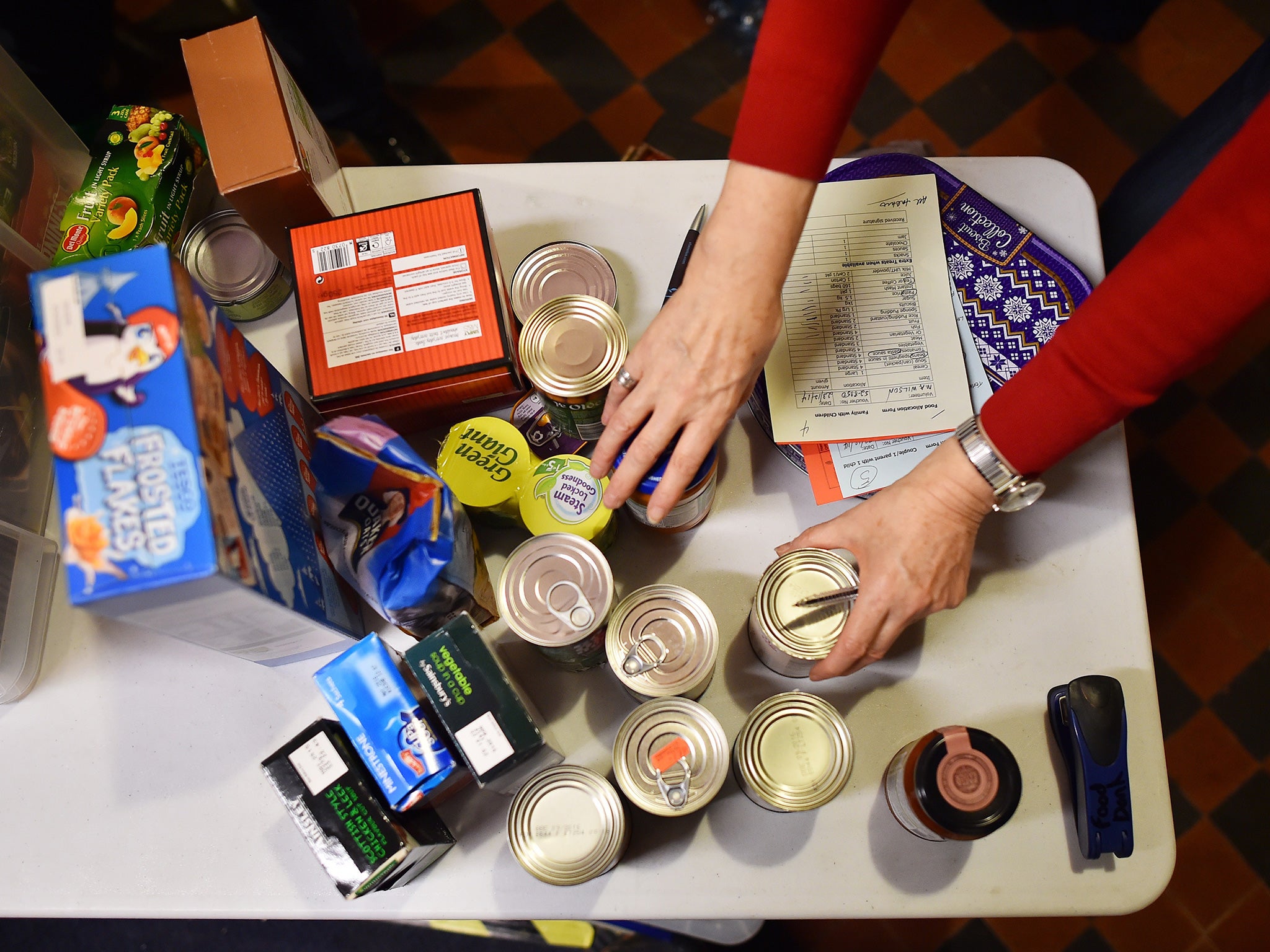Government refuses to investigate whether people claiming Universal Credit are forced to use food banks
Stance ‘only serves to demonstrate the contempt they have for the most vulnerable in our society,’ ministers are told

Ministers are refusing to investigate evidence that people claiming Universal Credit are flocking to food banks, sparking accusations they have “contempt for the most vulnerable”.
Charities and MPs of all parties have warned that long delays delivering the new benefit payments have left desperate people with no choice but to seek out emergency food aid.
Research by the respected Trussell Trust, which runs the UK’s biggest food bank network, found that demand had soared by a staggering 30 per cent.
Now the Department for Work and Pensions (DWP) has insisted it will not “collect or publish statistics” to corroborate, or disprove, that evidence.
Ministers believe it is not possible to keep count of the number of people using food banks without imposing “unnecessary burdens” on the volunteers running them.
But the stance was condemned by Dan Jarvis, a Labour MP demanding action on rising food bank use, as proof of the Government’s willingness to accept the “suffering” being caused.
“This research by the Trussell Trust clearly demonstrates the link between the way in which the Government is delivering Universal Credit, and people’s dependency on food banks,” he told The Independent.
“The fact that the Government won’t even investigate the impact that the rollout of Universal Credit is having only serves to demonstrate the contempt they have for the most vulnerable in our society.”
Mark Ward, the Trussell Trust’s interim chief executive, also said it was vital that the Government measure “the true scale of hunger”.
“Only then can we start developing proper national solutions to an issue that is growing more serious by the day,” he said.
“Though our network accounts for two-thirds of all food bank provision across the UK, it can’t give us information on how many people are helped by independent food banks, or the number of people hidden away, only just coping by skipping meals. That’s why we’ve always been clear our figures are just the tip of iceberg.”
The criticism comes as Theresa May faces a Commons defeat over delays that claimants face for their payments.Tory backbenchers have joined calls for the long wait before a first payment comes through – currently six weeks – to be cut.
A recent poll for The Independent found that three-quarters of British people – including most Conservative voters – want payment delivery to be speeded up significantly.
But there are wider criticisms that Universal Credit is causing problems beyond the controversy over the wait for payments. Experts say it penalises the self-employed, people working part-time and women, because payments go to a single household earner – usually a man.
And cuts to the “work allowance” – the amount of earnings claimants can keep before losing benefits – have swiped more than £1,200 a year from two-children families in which both parents work.
The shake-up replaces six different working-age benefits with a single payment, making the system simpler to understand and administer, Ms May has insisted.
But the Trussell Trust said its figures showed food bank use in areas where Universal Credit was been introduced is up by an average of 30 per cent since April.
In areas not yet reached by the new benefit, demand has also risen significantly – but by 12 per cent, less than half as much.
The organisation warned that food banks will struggle to meet the soaring need for emergency supplies this Christmas, partly because of the six-wait for Universal Credit.
Separately, the Peabody Trust housing association, one of the UK’s biggest social landlords, has calculated the delays will put about 23,000 families – with 41,000 children – at risk of destitution in the run-up to Christmas.
The problems are likely to escalate with the extension of Universal Credit. Even by the end of January, only 10 per cent of benefits claimants will be receiving it.
The DWP’s position was revealed when Mr Jarvis asked a parliamentary question to find out “whether the usage of food banks has changed in places where Universal Credit has been rolled out”.
The response said: “This Department has made no assessment of recent trends in food bank use, and has no plans to collect or publish statistics.”
The delay between people making a claim and receiving their first payment is designed to mimic waiting for a first pay cheque after starting a job.
Quizzed by Jeremy Corbyn in the Commons recently, the Prime Minister insisted that advance payments were available for people who needed help to bridge the gap.
A DWP spokesman said: “Reasons for food bank use are complex, so it’s misleading to link them to any one issue.
“We’re rolling out Universal Credit in a safe and secure way, monitoring its impact and making improvements to ensure people are getting the support they need.
“This includes strengthening the safety net around advance payments to make sure people know the maximum they can get upfront.”
Join our commenting forum
Join thought-provoking conversations, follow other Independent readers and see their replies
Comments
Bookmark popover
Removed from bookmarks